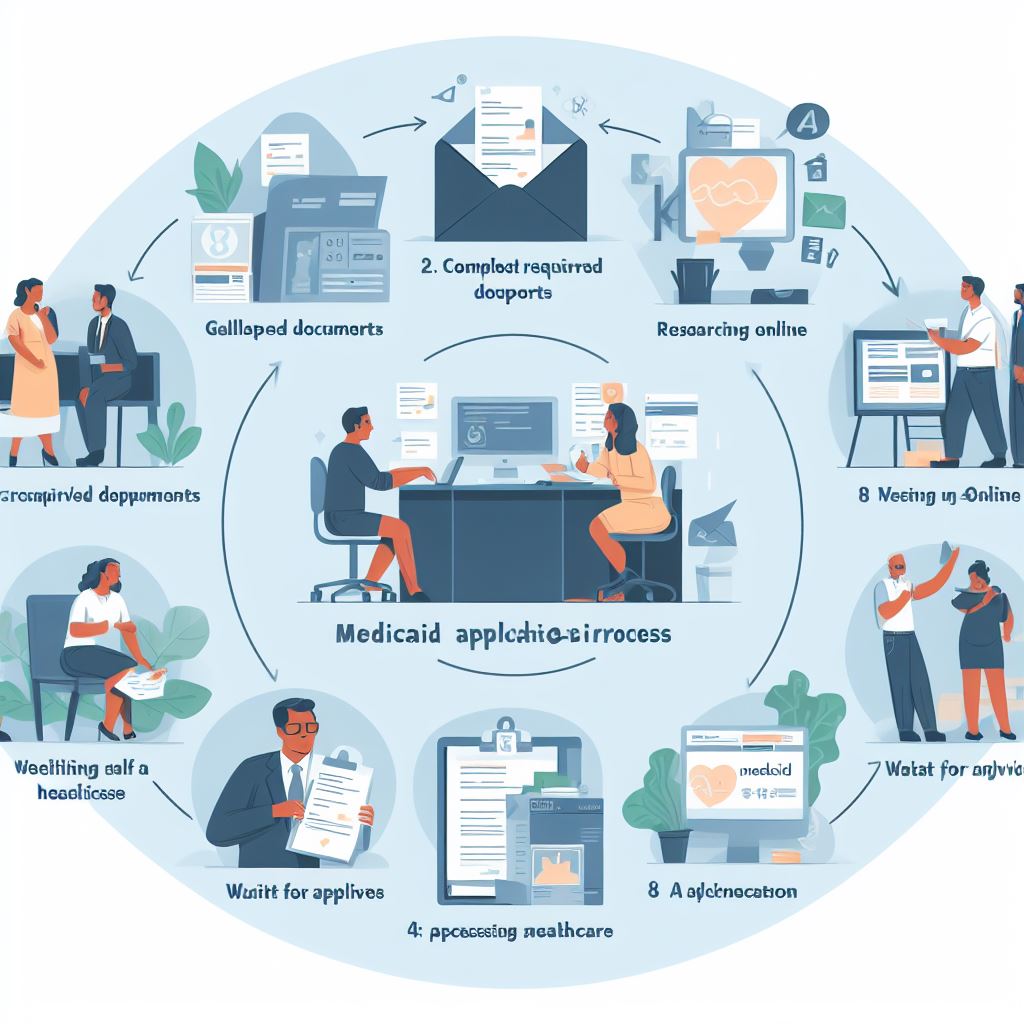8 Best Steps for Successful Medicaid Application

Do you want to successfully apply for Medicaid? Follow these 8 best steps and take control of your application process.
- Gather the required documents.
- Understand the eligibility criteria.
- Complete the application form accurately.
Don’t forget to provide your financial information and seek professional assistance if needed.
- Submit the application on time.
- Diligently follow up on your application status.
- Be prepared for the possible appeals process.
Let’s dive into these steps and secure your Medicaid benefits.
Key Takeaways
- Gather all necessary documents and double-check the application form
- Consider seeking professional assistance for complex aspects of the application
- Submit the Medicaid application on time and keep copies of the application form and supporting documents
- Stay informed about the status of the Medicaid application and be prepared for the appeals process if necessary
Gather Required Documents
To ensure a successful Medicaid application, you must begin by gathering all the required documents. This step is crucial as it ensures that you have all the necessary information to support your eligibility for Medicaid benefits.
The first document you need is proof of identity, such as a valid driver’s license or passport.
Next, you must gather proof of residency, which can include utility bills or a lease agreement.
Additionally, you’ll need to provide documentation of your income, including pay stubs or tax returns. If you have any assets, such as property or investments, you’ll need to provide proof of ownership and their current value.
It’s also important to gather any medical records or documentation related to your health condition.
Lastly, you may need to provide proof of any other insurance coverage you have, such as private health insurance or Medicare.
Understand Eligibility Criteria
To successfully apply for Medicaid, you need to have a clear understanding of the eligibility criteria.
This includes understanding the income requirements, which vary depending on factors such as family size and location.
Additionally, assets and resources are also considered when determining eligibility, so it’s important to be aware of what’s included in this assessment.
Income Requirements Explained
Understanding the eligibility criteria for Medicaid requires assessing your income. To determine if you meet the income requirements, you need to consider your household size and income level. Here is a table that outlines the income limits for different household sizes:
| Household Size | Maximum Monthly Income |
|---|---|
| 1 | $1,468 |
| 2 | $1,983 |
| 3 | $2,498 |
| 4 | $3,013 |
These income limits are based on the Federal Poverty Level (FPL) and may vary slightly by state. It’s important to note that Medicaid eligibility is also influenced by factors such as age, disability, and pregnancy. Once you understand the income requirements, you can move on to evaluating the assets and resources considered in the Medicaid application process. This helps determine your overall eligibility for the program.
Assets and Resources Considered
Evaluate your assets and resources to understand the eligibility criteria for Medicaid. Medicaid considers both your income and your assets when determining eligibility.
Assets can include things like cash, bank accounts, stocks, bonds, real estate, and vehicles. Some assets, such as your primary residence and personal belongings, may be exempt from consideration. However, it’s important to note that Medicaid has strict asset limits, and exceeding these limits can result in ineligibility.
It’s crucial to accurately assess your assets and resources to determine if you meet the Medicaid eligibility criteria. By understanding what assets are considered and the limits in place, you can make informed decisions and take appropriate steps to ensure a successful Medicaid application.
Once you have evaluated your assets and resources, you can proceed to complete the application form.
Complete the Application Form
Now that you understand the eligibility criteria, it’s time to complete the application form.
To ensure a successful application, make sure you have all the required documents ready, such as proof of income and residency.
Avoid common mistakes like providing incomplete information or forgetting to sign the form.
Once you have everything in order, submit the application through the designated process, whether it’s online, by mail, or in person.
Required Documents for Application
To successfully complete your Medicaid application, follow these steps:
- Gather personal identification documents: This includes your driver’s license or passport, as well as your social security card.
- Provide proof of income: Gather your pay stubs or tax returns, as well as any other financial documents that show your assets and liabilities.
- Submit documentation related to citizenship or immigration status: This may include a birth certificate or green card.
- Include any medical expenses or insurance coverage: Be sure to include supporting documents.
- Include relevant documents that support your eligibility: This may include disability records or proof of pregnancy.
Common Mistakes to Avoid
When completing the application form, make sure to avoid common mistakes that can hinder your chances of a successful Medicaid application. To help you navigate the process smoothly, here are some key points to keep in mind:
- Provide accurate information: Double-check that all the details you enter are correct, including your personal information, income, and household size.
- Include all required documents: Make sure to gather and attach all the necessary documents, such as proof of income, identification, and residency.
- Answer all questions: Ensure that you answer every question on the application form, leaving no blank spaces.
- Keep copies of everything: Make copies of your completed application form and all supporting documents for your records.
- Submit the application on time: Be mindful of the deadline and submit your application before it expires.
Application Submission Process
To complete your Medicaid application, you’ll need to fill out the application form accurately and provide all the required information and documents.
The application form is a vital part of the process, as it allows the Medicaid agency to assess your eligibility. Make sure to answer each question truthfully and provide any necessary supporting documentation. This may include proof of income, residency, and citizenship or immigration status.
Double-check the form to ensure you haven’t missed any sections or left any fields blank. Incomplete or incorrect information can lead to delays or even denial of your application.
Additionally, be sure to gather all the necessary documents before submitting the application to avoid any unnecessary delays. Taking the time to complete the application form accurately and providing all the required information and documents can greatly increase your chances of a successful Medicaid application.
Provide Accurate Financial Information
Gather all necessary documents to accurately report your financial information for the Medicaid application. Providing accurate financial information is crucial in ensuring the success of your Medicaid application. Here are five important steps to help you provide accurate financial information:
- Collect all relevant financial documents, such as pay stubs, tax returns, bank statements, and proof of income for all household members.
- Calculate your household income accurately, including any additional sources of income, such as social security benefits or rental income.
- Report all assets and resources, such as property, vehicles, savings accounts, and investments. Be sure to include accurate values for these assets.
- Provide details about your monthly expenses, including rent or mortgage payments, utilities, transportation costs, and healthcare expenses.
- Keep track of any changes in your financial situation and promptly update your Medicaid application if there are any modifications.
By following these steps and providing accurate financial information, you can ensure that your Medicaid application is processed smoothly and efficiently.
Remember to double-check all the information you provide to avoid delays or potential issues with your application.
Seek Professional Assistance, if Needed
If you’re unsure about any aspect of your Medicaid application, consider seeking professional assistance to navigate the process smoothly. Applying for Medicaid can be complex, and a professional can help ensure that you provide all the necessary information and documentation accurately. They can guide you through the application process, answer any questions you may have, and help you understand the eligibility requirements for Medicaid coverage.
There are various professionals you can turn to for assistance. Medicaid enrollment counselors, social workers, and legal aid organizations are all resources that can provide guidance and support. These professionals are knowledgeable about the Medicaid program and can help you complete the application correctly, increasing your chances of approval.
Additionally, seeking professional assistance can save you time and reduce stress. They’re familiar with the application process and can help you avoid common pitfalls and delays. They can also help you gather the required supporting documents, such as income verification and medical records, ensuring that your application is complete and accurate.
Submit the Application on Time
Make sure you submit your Medicaid application on time to avoid any potential delays or denials. Here are some key steps to help you stay on track:
- Gather all necessary documents: Ensure you have all the required documents, such as proof of income, identification, and residency, before starting your application. This will help you complete the process smoothly and prevent any last-minute scrambling.
- Double-check the application form: Carefully review your application form for any errors or missing information. Inaccurate or incomplete forms can lead to delays or even denials. Take your time to fill it out correctly and provide all the necessary details.
- Submit online, if possible: Many states offer the option to submit your Medicaid application online. This can save you time and provide a faster processing time compared to mailing in a paper application. Check your state’s Medicaid website for online submission options.
- Keep copies of everything: Make copies of your completed application form and all supporting documents. This will serve as your record and can be useful for reference or in case any issues arise during the application process.
- Track your application: After submitting your application, keep track of its progress. This can be done by checking the status online or contacting the Medicaid office. This will allow you to follow up on your application and address any potential issues or additional information required.
By ensuring you submit your Medicaid application on time and following these steps, you can increase your chances of a successful application process.
Now, let’s move on to the next section and discuss how to follow up on your application status.
Follow Up on Your Application Status
To ensure the smooth progress of your Medicaid application, it is important to stay informed about the status of your application. Following up on your application status allows you to address any issues or provide any additional information that may be required. It also gives you peace of mind knowing where you stand in the process. Below is a table that outlines the different application statuses and what they mean:
| Application Status | Meaning | Action Required |
|---|---|---|
| Received | Your application has been received and is being processed. | No action required. |
| Incomplete | Your application is missing some information or documentation. | Provide the requested information. |
| Pending | Your application is being reviewed and evaluated. | No action required. |
| Approved | Your application has been approved, and you are eligible for Medicaid benefits. | No action required. |
| Denied | Your application has been denied, and you are not eligible for Medicaid benefits. | Consider filing an appeal if eligible. |
By checking the status of your application regularly, you can ensure that you stay updated on any changes or requests from the Medicaid office. This will help you take timely action and prevent any unnecessary delays in the process.
As you stay informed about your application status, it is essential to be prepared for the possibility of an appeals process. Being denied Medicaid benefits does not necessarily mean the end of the road. In the next section, we will discuss how to navigate the appeals process if needed.
Be Prepared for Possible Appeals Process
To be prepared for the possible appeals process, you should understand that being denied Medicaid benefits doesn’t necessarily mean the end of the road. There are steps you can take to challenge the decision and potentially receive the benefits you need. Here are some important things to keep in mind:
- Review the denial letter: Carefully read the denial letter you receive from Medicaid. It should outline the reasons for the denial, which can help you identify any errors or misunderstandings.
- Gather supporting documents: Collect any additional documents or evidence that can support your case. This may include medical records, doctor’s notes, or letters of recommendation.
- File an appeal: Follow the instructions provided in the denial letter to file an appeal. Make sure to meet all deadlines and include all necessary documentation.
- Prepare for a hearing: If your appeal isn’t resolved through the initial review, you may be granted a hearing. Prepare your case by organizing your evidence and practicing your presentation.
- Seek legal assistance: If you’re unfamiliar with the appeals process or find it overwhelming, consider seeking legal assistance. An attorney experienced in Medicaid appeals can provide guidance and support.
Frequently Asked Questions
What Are the Income Limits for Medicaid Eligibility?
You need to know the income limits for Medicaid eligibility. The income limits vary by state and household size. It’s important to check with your state’s Medicaid office for the specific limits that apply to you.
Can I Apply for Medicaid Online?
Yes, you can apply for Medicaid online. It is a convenient and efficient way to submit your application. Visit the official Medicaid website for your state and follow the instructions to complete the online application process.
How Long Does It Usually Take for a Medicaid Application to Be Processed?
It usually takes a few weeks for a Medicaid application to be processed. Make sure you have all the necessary documents and information ready to speed up the process.
What Happens if I Provide Inaccurate Financial Information on My Application?
If you provide inaccurate financial information on your Medicaid application, it could lead to delays in processing or even denial of benefits. It is crucial to be honest and provide accurate information to avoid any complications.
What Should I Do if My Medicaid Application Gets Denied?
If your Medicaid application gets denied, don’t panic. Take these steps: review the denial letter, understand the reason for denial, gather necessary documents, and file an appeal within the given timeframe.



